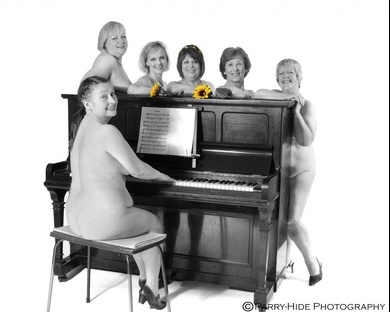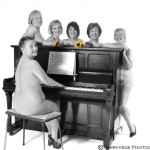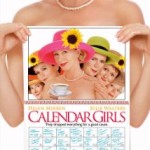There can’t be too many Brits who aren’t aware of the nude calendar originally devised by the ladies of Rylstone Women’s Institute (Knapely in the fictional version) who stripped for coy photos in aid of Leukaemia research after the death of the husband of one of the ladies, John (Clarke in the play and movie, Baker in real life), from the wretched disease, and the subsequent bittersweet Hollywood movie with a cast consisting almost of a who’s who of British character acting talent (Mirren, Imrie, Walters, Crosbie, Wilton, James, Bassett, Alderton, Hinds, Glenister etc.)
The movie was a hit and is warmly remembered by many people of un certain age, so the subsequent stage adaptation by Tim Firth is something of a poisoned chalice for amateur companies. Invariably any lady playing Annie Clarke on stage will find themselves compared to Julie Walters in the movie, much as, for example, anyone playing Fagin in the stage version of Oliver will perpetually have the ghost of Ron Moody‘s performance hanging over them – and such shadows are very hard to escape. It is in any case a quite unreasonable and misleading comparison, since every stage actor will in the course of rehearsals bring out different aspects of the character and present a unique interpretation.
So it is a pleasure to report that Laura Bennett’s assured production for the CARDS succeeds in capturing the essence of Calendar Girls without ever sounding derivative. In fact, this performance translates to its audience as mature, confident, competent and totally in control of its own destiny. The response from a packed audience at Writtle Village Hall told its own story: spontaneous applause and laughter, a general hum of satisfaction and pleasure. This is why amateur companies perform – we feed off the audience reaction and feel like we are floating, so to hit the spot so markedly makes for a happy cast and crew.
In fairness, happiness is nothing less than the group deserves, nor indeed Leukaemia and Lymphoma Research, who are benefitting from this production. The show flows, the timing is spot-on, the bonhomie and humour shine through, as does the bravery of the ladies. Although my hearing is less than brilliant, most of the cast projected well and their words were seldom lost in the ether, though they projected visually as well as orally – both in characterising roles and in the coy nudity as the ladies strip for the calendar.
The Mirren role is carried off with no little panache by Paulette Harris, off-hand humour and humility concealing a steely determination. She is matched all the way by Sharon Goodwin’s public dignity and private mourning as the widowed Anne (Walters in the movie.) Credit also to Barbara Llewellyn for her fine voice and sassy attitude, though it is unfair to single out any of the ensemble. All the women play their roles in the WI community to great effect, supported by men who, John excepted, are for the most part useless – a neat twist on the common fictional misogyny. Daniel Curley plays the role of a taciturn Yorkshireman like a native, and deserves credit for leaving a big gap in the community after his untimely demise.
Credit too for the excellent production design in the face of a tricky play that requires constant costume changes and an endless series of props. From personal experience, I know only too well that all the additional business requires very careful management and a crew and cast that are totally on the ball. Done well, the action glides smoothly as a swan on the water from the audience perspective, concealing the controlled chaos under the water. Here, it has been pulled off with aplomb. The props are hugely effective too, not least the sunflowers blooming at the very end of the play, symbol of leukaemia research and sign of hope that each death is not in vain.
A worthy play and a worthy performance, demonstration if it were ever needed that amateur groups are not amateurish. Congratulations to the ladies (and the odd bloke too) – you richly deserve your success!




